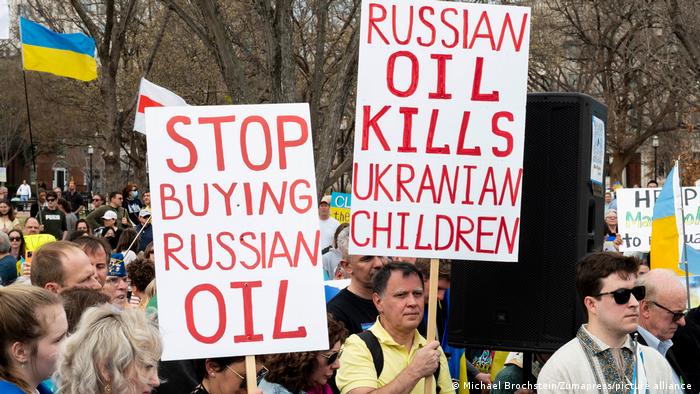
As the Russian invasion of Ukraine intensifies, calls have been growing to boycott Russian oil. In an appeal released last week, 465 organizations in 50 countries asked their governments to stop using Russian energy.
"The world's fossil fuel addiction is funding Putin's warmongering," said the statement, which was signed by organizations like Greenpeace, Extinction Rebellion and Fridays for Future, among many others.
In an oil market analysis published by The Oxford Institute for Energy Studies last week, Russia is ranked as the second-biggest producer of crude oil in the world, pumping around 14% of the world's total output in 2021. About 60% of Russian crude exports go to Europe, with another 35% heading to Asia.
Experts say Europe alone is paying Russia around €350 million ($382 million) a day for it.
As the letter writers and others, including Ukrainian Foreign Minister Dmytro Kuleba on Twitter, have pointed out, if the world keeps using Russian oil and gas, this negates the international sanctions and boycotts that are supposed to persuade Russia to withdraw from Ukraine.
No Russian energy sanctions
The importance of Russian oil is part of the reason why it has not been sanctioned. Even if governments would want to ban Russian oil, they would be hard-pressed to replace it and, most importantly, would find it difficult to avoid causing oil prices to skyrocket.
Even before the Russian invasion of Ukraine, oil prices were high. As the world is recovering from the COVID-19 pandemic, higher-than-expected demand met sluggish supply from producers.
Due to the war in Ukraine and fears of further market disruption, oil prices are now rising even higher.
On Monday, the cost of a barrel of Brent crude oil surged to $139 (€128), coming close to its record price of $147.50 reached in 2008. Brent crude sets the benchmark value of around two-thirds of the world's oil.
According to the Oxford Institute's report, analysts expect an average oil price of around $116 a barrel this year.
Higher prices obviously benefit Russia, and are also negatively impacting Western economies. So the search for substitutes for Russian oil, as well as ways to counteract energy price rises, has become even more urgent.
Output up, prices down
Part of the answer could lie with the world's largest producer of crude oil, Saudi Arabia.
Saudi Arabia and neighboring United Arab Emirates (UAE) are thought to be the only two major oil producers who could ramp up spare production comparatively easily.
It would still be difficult for their oil to quickly replace supply coming out of Russia, said Karen Young, founding director of the Program on Economics and Energy at the Middle East Institute, based in Washington. "Increasing production does not mean increasing exports directly to Europe," she told DW. "Oil markets are not that easily redirected."
Young said the biggest difference the Saudis could make is producing more oil to bring prices on the global market down. In mid-February, even before the Russian invasion began, the US government already asked the Saudis and UAE to pump more oil to ease prices.
At the most recent meeting of OPEC+ — the Organization of the Petroleum Exporting Countries plus allies led by Russia — members agreed not to deviate from their output plan made earlier this year. The group wants to only slowly increase output in 2022 after the COVID pandemic led to a historic fall in demand.
During a meeting on March 2 that lasted only 13 minutes, the 23 OPEC+ members simply said they would increase output by an agreed 400,000 barrels per day in April, and didn't even mention the Ukraine war in their final document.
Not turning to Russia
"OPEC has had a long-standing policy of not changing production or supply on the basis of geopolitical events," explained Hasan Alhasan, a research fellow on Middle East policy for the International Institute for Strategic Studies in London. "They only change in response to changes in market fundamentals."
Alhasan suggested that more US pressure might help. After all, the United States is a traditional security partner for the Gulf nations and they are not pivoting toward Russia. But right now, Alhasan cautioned, this is technically a conflict between third parties.
The Saudi's perception of the conflict could change, though, if the war continues to worsen and other countries — or even NATO — gets involved, or if a total ban on Russian oil is introduced.
The lack of sanctions on Russian energy exports undermines Europe's argument, Alhasan said. Without those sanctions, "it makes it difficult to make a case for why the Gulf states should stick their necks out," he told DW.
"I think a warmer reception and a direct request from President Biden to [Saudi Crown Prince] Mohammed bin Salman could also go a long way to encourage more Saudi production," said Young of the Middle East Institute. But the US president has yet to speak directly with the Saudi leader.
The global pushback against Russia's war on Ukraine, including so-called self-sanctioning strategies, may also have an impact on Saudi Arabia's willingness to change output policy. Port workers all around the world have refused to unload Russian oil, while financiers, spooked by sanctions, are refusing to provide credit or payment methods for Russian oil deals.